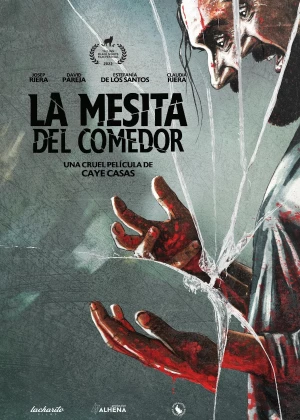The Coffee Table
Movie details

In 2017, Caye Casas and Albert Pintó directed Killing God, a minor (but superb) Spanish genre film that went completely under most people's radar. It took me a while to catch up with the film, but I immediately recognized these directors held the power to bring something unique to the medium. Pintó and Casas went solo after that, with Casas going on the direct The Coffee Table [La Mesita del Comedor]. The film suggests he's probably the most gifted of the two, or at the very least the one whose ideas stand out the most. This is cult cinema in the making, so you better make sure you don't miss your chance to see this one.
![screencap of The Coffee Table [La Mesita del Comedor]](/thumbs/img/articles/1200xauto/coffee-table-1.webp)
Spanish post-millennium genre films have a solid reputation, but like many smaller niches, their signature qualities would ultimately herald their downfall. When too many people are trying to make the same film repeatedly, the audience will eventually grow tired of them. While it may have disappointed some fans, these moments give way to new talent to revitalize a dying genre and develop something novel. Cayas, who has writing credits for Killing God and The Coffee Table, did exactly that. Gone are the tortured ghosts draped in past trauma, instead, enter the uncomfortable and unsettling headscratcher with a twist and some very dark humor.
The Coffee Table is the kind of film that builds up a character and makes him pleasant and relatable, only to pull the rug from under him moments later. It's been a long time since I felt so bad for a fictional character, which does wonders for the stress levels that fuel this tale of horror. What sets The Coffee Table apart from similar films is the streak of dark comedy that runs underneath the entire thing. It's pitch black and it needed to be balanced perfectly so as not to ruin the dramatic premise, but Cayas nails that combo and as a result, delivers a film that is both intense and uncomfortably funny.
A young father (Jesus) feels that his overbearing wife (Maria) controls everything in his life. Wanting to make a statement, he has found a very peculiar, kitsch coffee table which he demands to buy. His wife finds the thing atrocious, but Jesus makes a stand and wins the argument. When at home, he discovers that one of the screws is missing from the package. Meanwhile, his wife goes out to do some shopping, leaving him all alone with the baby for the first time. Somewhat frustrated he calls the salesman and demands that he bring over a spare screw right away, but his day is about to take a turn for the worse.
![screencap of The Coffee Table [La Mesita del Comedor]](/thumbs/img/articles/1200xauto/coffee-table-2.webp)
Most of the film is set inside the couple's apartment, though it's not a pure single-location film. Cayas doesn't go for flashy visuals or showy camera work, instead, he works with lengthy close-ups and slow pans to add tension to the film. And with success too. With relatively little Cayas is able to really drive up the intensity and turn what is a relatively boring flat into a visually appealing set. With some extra attention going to lighting and use of color I believe he could've pushed it even further, but that's just a personal nitpick.
The soundtrack has a more supportive role to play. It's there to help build up the mood and drive up the tension, but it does so mostly in the background (though its presence grows as the film nears the finale). There are one or two scenes where it takes on a more prominent role, but with the broader focus on the perilous situation of the lead character, I think this is one of those films that didn't necessarily need a very attention-grabbing score. The music is good and it is very functional, so there's nothing to complain about really.
A film like The Coffee Table is highly dependent on its actors to get the right vibes across. I'm not saying the film features only powerhouse performances, but all the actors hit their mark and delivered exactly what was expected from them. Pareja and de los Santos (the core couple) are particularly strong. The tension between them is palpable and Pareja embodies the ultimate tragic figure, whereas de los Santos is the spouse you love to hate. The secondary parts are on point too, with the sleazy salesman being a very memorable character, but none of them were able to upstage the principal actors.
![screencap of The Coffee Table [La Mesita del Comedor]](/thumbs/img/articles/1200xauto/coffee-table-3.webp)
Cayas takes his time to set the stage with a handful of prolonged sequences in which he already gives plenty of nods to the impending doom. After one pivotal scene that turns Jesus' life into a walking nightmare, the film fully sinks its teeth into Jesus' dilemma and puts him in situations that only add fuel to the fire. That's where the dark comedy streak comes in, though I'm fairly certain there will be many who won't even pick up on it. The remainder of the film works up towards an inevitable finale, which doesn't disappoint in the slightest.
The Coffee Table is a film stripped of any excess, with a strong focus on its core premise and working hard to get the most out of it. At its heart it's basic genre fare, but Cayas' clever writing and pointed, confident direction add the needed flair and polish to turn it into a memorable film. From what I've seen the film is also making good on its cult potential, so there is hope that any availability issues may be void in the future. Caye Cayas confirms he is a director to keep an eye on, hopefully, his next one won't take quite as long.